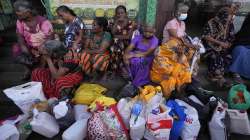Sri Lanka's fuel crisis touches new heights: Govt to shut offices, schools from next week
With its existing fuel stocks fast depleting, Sri Lanka is under intense pressure to get foreign exchange to pay for its imports, which has brought several sectors of the country’s economy to a grinding halt.

The fuel crisis in Sri Lanka hit a new high, with the country's government announcing a shut-down of public sector offices from next week, beginning Monday. The island nation has been reeling its worst economic crisis for the past several weeks.
The country has been facing several power cuts, and the government has now asked teachers in all government and government approved private schools in the Colombo city limits to conduct online classes from next week. With its existing fuel stocks fast depleting, Sri Lanka is under intense pressure to get foreign exchange to pay for its imports, which has brought several sectors of the country’s economy to a grinding halt.
Consequently, spontaneous protests have been reported at filling stations around the country where consumers have been waiting in long serpentine queues for fuel for hours.
"Taking into consideration the severe limits on fuel supply, the weak public transport system and the difficulty in using private vehicles this circular allows minimal staff to report to work from Monday," the Public Administration and Home Affairs Ministry said in a circular issued on Friday. However, those employed in the healthcare sector will have to continue reporting to work, the circular stated.
The Sri Lankan Education Ministry announced that all government and government approved private schools in the Colombo city limits would remain shut in the next week due to prolonged power cuts, and asked teachers to conduct classes online, the Daily Mirror newspaper reported.
Sri Lanka is facing power outages for upto 13 hours in a day for the past several months now.
Earlier this week, Sri Lanka's cash-strapped government approved several measures, including imposing a 2.5 per cent social contribution tax on companies based on their turnover and declaring Fridays as holidays for most public sector employees, to facilitate the economic recovery and mitigate energy and food crisis.
The Cabinet also approved a move to grant government officials one leave per week for the next three months to engage in agriculture to mitigate the approaching food crisis.
On Friday, Sri Lanka’s Prime Minister Ranil Wickremesinghe said that around four to five million out of the country’s 22 million population could directly be affected by the food shortage.
The nearly bankrupt country, with an acute foreign currency crisis that resulted in foreign debt default, announced in April that it is suspending nearly USD 7 billion foreign debt repayment due for this year out of about USD 25 billion due through 2026.
Sri Lanka's total foreign debt stands at USD 51 billion.
(pti inputs)
ALSO READ | World Bank rules out new loan commitments to crisis-hit Sri Lanka
ALSO READ | India sends one more consignment of 40,000 MT of diesel to crisis-hit Sri Lanka